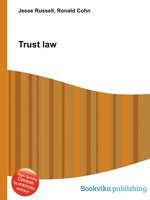Trust law
Jesse Russell Ronald Cohn
бумажная книга
High Quality Content by WIKIPEDIA articles! In common law legal systems, a trust is a relationship whereby property (real or personal, tangible or intangible) is held by one party for the benefit of another. A trust conventionally arises when property is transferred by one party to be held by another party for the benefit of a third party, although it is also possible for a legal owner to create a trust of property without transferring it to anyone else, simply by declaring that the property will henceforth be held for the benefit of the beneficiary. A trust is created by a settlor (archaically known, in the context of trusts of land, as the feoffor to uses), who transfers some or all of his property to a trustee (archaically known, in the context of land, as the feoffee to uses), who holds that trust property (or trust corpus) for the benefit of the beneficiaries (archaically known as the cestui que use, or cestui que trust). In the case of the self-declared trust, the settlor and trustee are the same person. The trustee has legal title to the trust property, but the beneficiaries have equitable title to the trust property (separation of control and ownership). The trustee owes a fiduciary duty to the beneficiaries, who are the "beneficial" owners of the trust property. (Note: A trustee may be either a natural person, or an artificial person (such as a company or a public body), and there may be a single trustee or multiple co-trustees. There may be a single beneficiary or multiple beneficiaries. The settlor may himself be a beneficiary.)


